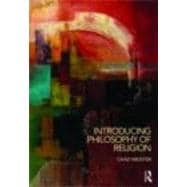
Note: Supplemental materials are not guaranteed with Rental or Used book purchases.
Purchase Benefits
What is included with this book?
| List of illustrations | p. x |
| Preface | p. xi |
| Introduction | p. 1 |
| Scope and structure | p. 2 |
| Pedagogical features and resources for further exploration | p. 3 |
| Religion and the philosophy of religion | p. 5 |
| Religion and the world religions | p. 6 |
| Philosophy and the philosophy of religion | p. 8 |
| Philosophy of religion timeline | p. 10 |
| Religious beliefs and practices | p. 14 |
| Summary | p. 19 |
| Questions for review/discussion | p. 20 |
| Further reading | p. 20 |
| Websites | p. 21 |
| Religious diversity and pluralism | p. 23 |
| The diversity of religions | p. 24 |
| Religious inclusivism and exclusivism | p. 26 |
| Religious pluralism | p. 31 |
| Religious relativism | p. 35 |
| Evaluating religious systems | p. 37 |
| Religious tolerance | p. 41 |
| Summary | p. 42 |
| Questions for review/discussion | p. 43 |
| Further reading | p. 43 |
| Websites | p. 44 |
| Conceptions of ultimate reality | p. 45 |
| Ultimate Reality: the Absolute and the Void | p. 46 |
| Ultimate Reality: a personal God | p. 51 |
| Summary | p. 60 |
| Questions for review/discussion | p. 61 |
| Further Reading | p. 61 |
| Websites | p. 63 |
| Cosmological arguments for God's existence | p. 65 |
| The argument from contingency | p. 66 |
| The sufficient reason argument | p. 72 |
| The Kalam argument | p. 76 |
| A cosmological argument for atheism | p. 84 |
| Summary | p. 87 |
| Questions for review/discussion | p. 88 |
| Further Reading | p. 88 |
| Websites | p. 89 |
| Teleological arguments for God's existence | p. 91 |
| Paley's design argument | p. 92 |
| A fine-tuning argument | p. 97 |
| An intelligent design argument | p. 101 |
| Summary | p. 107 |
| Questions for review/discussion | p. 108 |
| Further reading | p. 109 |
| Websites | p. 109 |
| Ontological arguments for God's existence | p. 111 |
| Anselm's ontological argument | p. 112 |
| Plantinga's modal ontological argument | p. 118 |
| Summary | p. 122 |
| Questions for review/discussion | p. 124 |
| Further reading | p. 124 |
| Websites | p. 125 |
| Problems of evil | p. 127 |
| Sketching the terrain | p. 128 |
| Theoretical problems of evil | p. 132 |
| The existential problem of evil | p. 138 |
| Three theodicies | p. 139 |
| Summary | p. 144 |
| Questions for review/discussion | p. 145 |
| Further Reading | p. 145 |
| Websites | p. 146 |
| Science, faith, and reason | p. 147 |
| Religion and science | p. 148 |
| Religious belief and justification | p. 153 |
| Summary | p. 164 |
| Questions for review/discussion | p. 165 |
| Further Reading | p. 166 |
| Websites | p. 167 |
| Religious experience | p. 169 |
| The nature and diversity of religious experience | p. 170 |
| Religious experience and justification | p. 176 |
| Challenges to religious experience as justification for religious beliefs | p. 179 |
| Scientific explanations of religious experience | p. 182 |
| Summary | p. 184 |
| Questions for review/discussion | p. 185 |
| Further Reading | p. 186 |
| Websites | p. 187 |
| The self, death and the afterlife | p. 189 |
| Conceptions of the self | p. 190 |
| Reincarnation and karma | p. 196 |
| Arguments for immortality | p. 198 |
| Arguments against immortality | p. 201 |
| Summary | p. 204 |
| Questions for review/discussion | p. 205 |
| Further reading | p. 206 |
| Websites | p. 207 |
| Glossary | p. 209 |
| Notes | p. 217 |
| Index | p. 237 |
| Table of Contents provided by Ingram. All Rights Reserved. |
The New copy of this book will include any supplemental materials advertised. Please check the title of the book to determine if it should include any access cards, study guides, lab manuals, CDs, etc.
The Used, Rental and eBook copies of this book are not guaranteed to include any supplemental materials. Typically, only the book itself is included. This is true even if the title states it includes any access cards, study guides, lab manuals, CDs, etc.